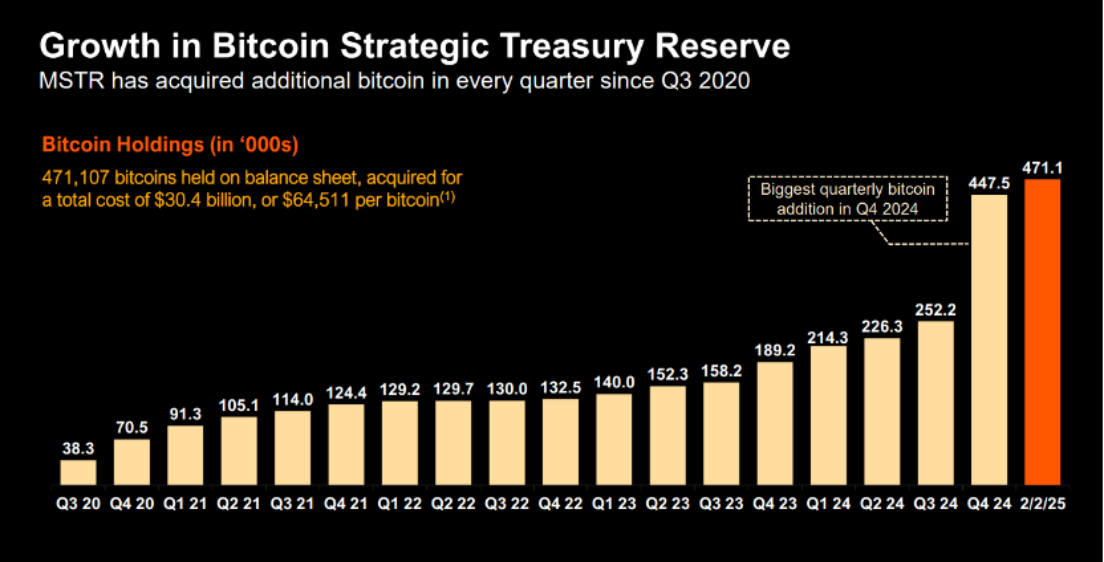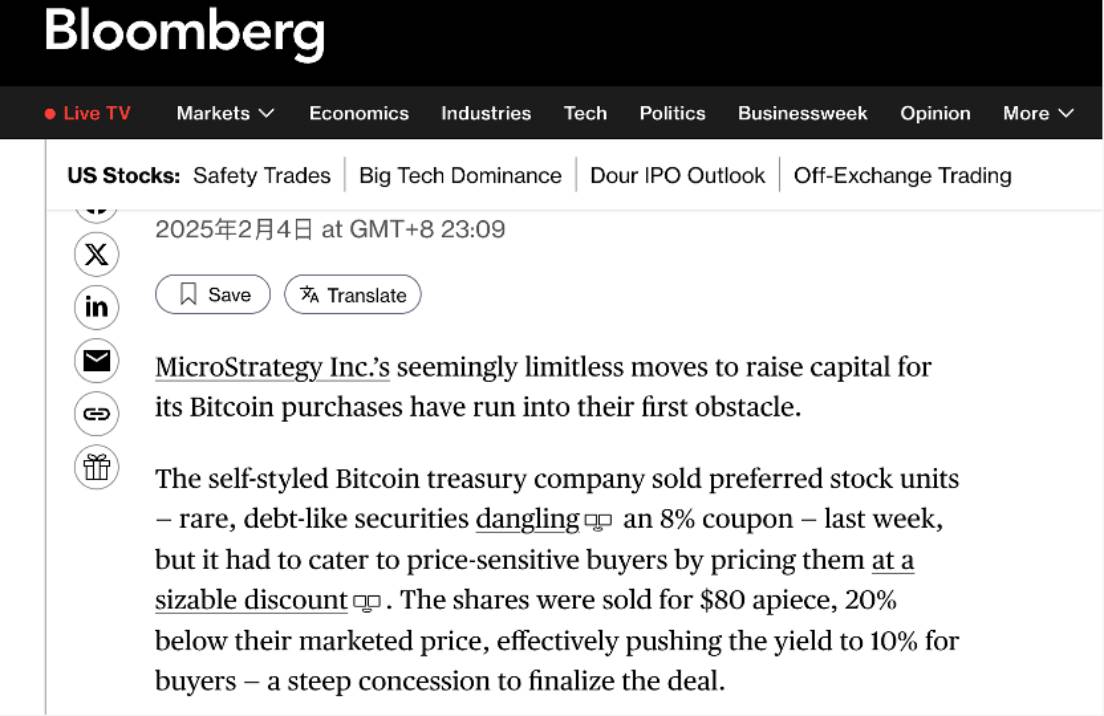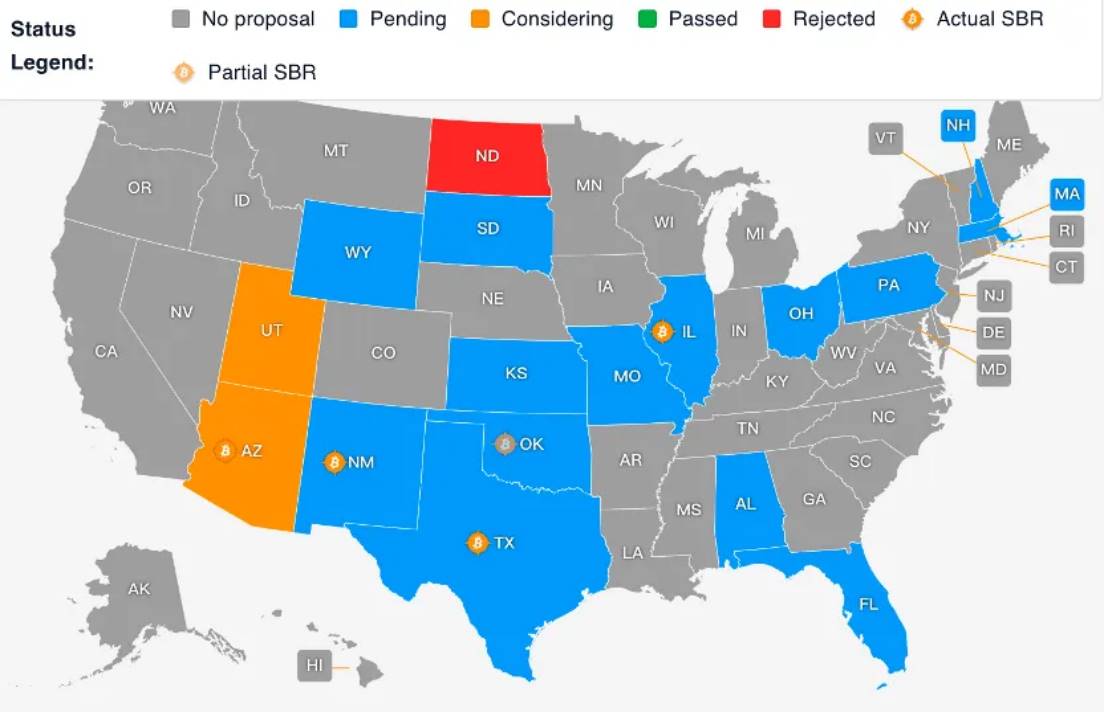By Hedy Bi, OKG Research
With TRON's return to power, the political direction and economic policies are reshaping the global capital landscape at a startling pace. Against this backdrop, STRATEGY (formerly MicroSTRATEGY, hereinafter referred to as STRATEGY) - a publicly traded company known for its massive acquisition of BITCOIN, has suddenly announced a pause in new BITCOIN purchases. And in last night's earnings call, STRATEGY set a 2025 annual "BITCOIN USD earnings" target of $10 billion. Assuming that STRATEGY's BITCOIN purchases are fully funded by financing, to achieve this target, either BITCOIN prices need to double, or STRATEGY needs to at least double its current holdings at the existing cost basis, assuming BITCOIN maintains its current price.
As the world's largest corporate BITCOIN holder, as of February 7, 2024, STRATEGY holds 450,000 BITCOINS, with an average cost of about $62,000, ranking among the top five global BITCOIN holders, accounting for about 2.38% of the total BITCOIN supply. This proportion is comparable to the United States' official gold reserves, which rank first in the world's central bank gold reserves (World Gold Council), also demonstrating STRATEGY's leading advantages and strategic determination in the crypto-asset field. As a result, STRATEGY's transparency and clear investment strategy have made its portfolio changes an important perspective for global investors to focus on cryptocurrencies.

For investors who are accustomed to seeing STRATEGY as a "digital gold treasury," STRATEGY's recent moves have undoubtedly sparked heated discussions. How should we interpret this "inconsistent" strategy? The author will analyze why STRATEGY has changed its BITCOIN investment strategy and the impact this move will have on the BITCOIN market.
Why did STRATEGY choose to pause purchases after TRON took office? The answer is far more complex than it appears on the surface. One key factor is the pressure the company has faced on its performance and accounting treatment.
First, although STRATEGY's BITCOIN holdings doubled in the fourth quarter of 2024, it recorded a net loss per share of $3.03, far exceeding the analyst's expected loss per share of -$0.12, mainly due to a large impairment charge on its digital assets. Under the old accounting standards, when the price of BITCOIN falls below its purchase cost, the company needs to reflect this loss in its financial statements. If the fair value of an asset is lower than its carrying amount, an impairment loss must be recognized.

Such unexpected losses can undermine investor confidence in the company, leading them to demand higher returns to bear investment risks, making it more difficult to attract investors to buy its preferred shares, which is why we see, according to Bloomberg, STRATEGY selling new preferred shares at a 20% discount. However, for investors who are optimistic about STRATEGY's prospects, the discounted issuance effectively increases the buyers' yield.

Meanwhile, with the implementation of the new FASB (Financial Accounting Standards Board) standards, while allowing STRATEGY to recognize the unrealized gains on its BITCOIN position for the first time, it has also made the tax issues it faces more complex: under the new accounting standards, STRATEGY needs to measure its BITCOIN holdings at fair value and reflect the unrealized gains in its financial statements. While this makes the balance sheet more transparent, it also means the company may need to pay the corporate alternative minimum tax (CAMT, about a 15% tax rate) on these unrealized gains. Faced with a potentially massive tax bill, STRATEGY must do financial planning to address its tax obligations. Pausing purchases may be a financial risk control measure to better assess and manage future tax burdens.
In addition, since the company was included in the NASDAQ 100 index, it has been subject to stricter information disclosure and corporate governance requirements, including more stringent insider trading policies to prevent insider trading. One of the reasons for pausing BITCOIN purchases may be related to the restrictions of the lock-up period. Although the SEC does not mandate that companies establish lock-up periods, many companies proactively set them, especially around financial report releases. For example, STRATEGY's Q4 2024 earnings were released on February 5, and the lock-up period may have started in January, restricting its BITCOIN purchases during this period.
In simple terms, STRATEGY has not lost confidence in BITCOIN's prospects, and its "inconsistent" behavior is not due to external market factors, but more to its own internal financial compliance reasons.
And other institutions in the market will not choose to follow suit and stop purchasing because of STRATEGY's own reasons. On the contrary, the United States, represented by the states, is implementing the adoption of BITCOIN as a strategic asset from the bottom up. Currently, 16 states have submitted relevant bills, two of which are progressing rapidly. According to the chart, 28,312 BITCOINS are likely to be purchased for investment purposes. And the "Pending" states do not mean they are not supporters of digital currencies like BITCOIN. Just today (February 7), Kentucky Representative TJ Roberts introduced HB376, proposing to invest 10% of the state's funds in digital assets with a market capitalization of over $750 billion.

$750 billion in investment, if largely implemented in BITCOIN investments, this amount of capital is almost equivalent to 39% of BITCOIN's current market value (as of February 7) and about two-thirds of the United States' official gold reserves. According to the World Gold Council, the value of the United States' gold reserves is about $1.1 trillion. And this scale of capital inflow is not through the background of any national reserve building, but purely driven by state government policies. This means that in addition to companies like STRATEGY, other institutions or governments are also making BITCOIN purchases. BITCOIN's position in the global financial system is constantly rising, with a combination of non-traditional features and unprecedented speed.
And this is just a microcosm of the new policies under the TRON era, full of uncertainty but also full of imagination.
This article is the third in the "TRON Economics" series special topic.
OKG Research has specially planned and launched the "TRON Economics" series special topic, in-depth analysis of the future trends and core logic of the crypto market as TRON 2.0's new policies are continuously implemented.
Other articles in this topic:
"TRON Re-elected: BITCOIN, Oil and Gold in the New Economic Era" focuses on BITCOIN's impact on the international financial landscape.
"TRON's Return: Stablecoins and BITCOIN, Who Can Solve the US Debt Dilemma?" delves into the $36 trillion US debt market, exploring how blockchain technology and crypto tools can further consolidate and expand the US dollar's dominant position in the global financial system.







